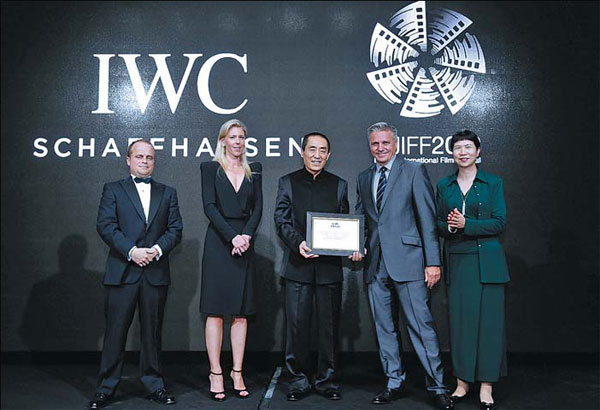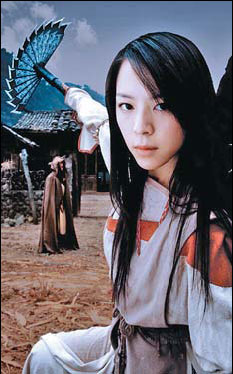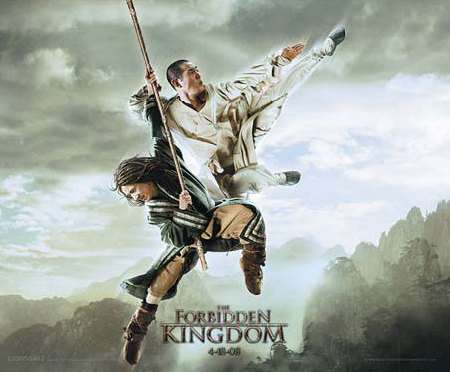Arranged marriage
Updated: 2013-05-03 07:35
(China Daily)
|
||||||||
|
The Motion Picture Association of America honored director Zhang Yimou as outstanding individual for promoting Sino-US film collaboration. Photos provided to China Daily |
Comment | Raymond Zhou
A co-production is supposed to help a film appeal to a broader international audience, but often leaves it creatively diminished and struggling at the box office.
Pauline Chan describes a co-production as a marriage that one commits to for roughly three years. Even though both sides are free to choose their partner, once a commitment is made it feels very much like "an arranged marriage".
Chan made 33 Postcards in 2011, the first official co-production between Australia, where the Hong Kong-born director is a citizen, and China. The movie is about a Chinese orphan girl who visits Sydney in search of the kind man who has been sponsoring her. It turns out he is a prisoner and never expected her to show up in his life.
The Australian government, which provided a tax rebate, was mostly concerned with where the shooting would take place, which determines how much the production could contribute to the local economy. The Chinese government, on the other hand, scrutinized the content of the story, assessing the moral of the story and the amount of Chinese elements. In the end, it qualified for a co-production on both sides, even though much of the plotline takes place Down Under.
At a workshop organized by the Motion Picture Association of America during the third Beijing International Film Festival, Chan avoided questions about her movie's box-office performance.
A quick browse of the media landscape shows that it received largely positive reviews in China, but attracted little public awareness. Its box-office figure was so low it did not even appear in the top 10 ranking for its first week, arguably the highest for most openings.
Just as nobody likes to talk about failed marriages, nobody is willing to address in public the tension and antagonism in a co-production.
If the end justifies the means, a money-maker may well reconcile all the differences. If it turns out to be a flop, it may well become a cautionary tale, raising a huge question mark over the enterprise of co-producing a feature film.
Judging from the end results from the past decade, the rationale for co-productions is in question. Not a single movie has been a hit in both producing countries, on critical and commercial grounds.
|
Sino-Finnish co-production Jade Warrior features Zhang Jingchu. |
The Forbidden Kingdom grossed 188 million yuan ($30.50 million) in China and $128 million globally, making it a financial success in both countries. But the teaming up of Jackie Chan and Jet Li failed to set sparks flying as anticipated, and each of the kung fu masters had headlined much better solo performances elsewhere.
The Karate Kid raked in 47 million yuan in China and $360 million globally, making it a blockbuster in the United States but a disappointment in China. Chinese audiences admitted they had expected a much stronger movie than what they saw on screen.
These are the biggest hits, albeit lopsided. The others are downright abysmal, so much so that many can be case studies for what to avoid in movie making.
Jade Warrior (2006), a Sino-Finnish co-production, features Chinese actress Zhang Jingchu's least memorable performance of her career, and it was not her fault. Shanghai, with a stellar cast of top names from China, Japan and the US, brought in 46 million yuan at China's box office and only $10 million globally, not enough to even pay the stars. It was never released in the US.
However, even with the greatest fiascos, the Western press reports with hushed excitement, citing isolated figures such as the number of screens in China that opened the movies. Nobody cares to ask if the investors have made their money back, or why they are never again involved in film making, or why they are in bankruptcy court, for that matter.
And of course, they would not deign to find out more about a Chinese phenomenon called "one-day tour" - meaning a movie makes a symbolic theatrical release and departs from the theater before the weekend is over.
China is such a shining beacon that anything in its glow would make a ton of money, or they believe so.
In a sense, this is the flip side of the myth that Chinese harbored decades ago that the US had gold-paved streets and all you needed to do was bend down and pick up the gold. Even busboys working in Chinatown restaurants were touted as millionaires when their stories traveled back to Chinese villages.
Co-productions can enable higher budgets, but it is highly questionable whether they will make better movies.
The two sets of administrative expenses mean the duplication of spending, which has nothing to do with the quality of a movie. The misuse of cultural references, almost unavoidable, can only be offensive. The token gesture of casting cameo roles for Chinese actors, for example, has so far aroused more contempt than good will.
As David Lee, a Chinese-American producer involved in several high-profile co-productions, explains, Hollywood attempts at co-production status would not have been controversial in China had the roles not been given to Chinese actors. And they did not get the co-production status anyway.
The pitfall of co-productions looms even more ominously, when examined from the perspective of those that could have got that status.
Lost in Thailand and Finding Mr. Right were the biggest runaway hits in late 2012 and early 2013. The majority of the storylines take place in foreign countries, Thailand and the US respectively. Yet, these are pure Chinese productions, with no creative input from Thai or US filmmakers. Had they been co-productions, they might not have taken off as spectacularly, or even fallen flat.
As David Lee puts it, the process of co-producing a movie is to remove its edginess, leaving a work so devoid of oomph that the audience, especially those in China, would never get excited about.
"The story in a co-produced film is bound to be weak. The executives of a studio love the concept, but audience members do not give a damn that it's a co-production or not," he says.
As comedies, the above movies are extremely sensitive to cultural nuances. A gag in one culture may simply look stupid in another. And anything that is not physical comedy may get lost in translation. As a matter of fact, comedic sensibility is like local anesthesia. It varies from place to place, even within one country.
When producer Bill Kong suggested to Xue Xiaolu, writer-director of Finding Mr. Right, that the latter do a romantic comedy in the spirit of Sleepless in Seattle, she responded to her Hong Kong boss that kind of love story would look ridiculously naive in an age of cynicism, which the mainland is obviously in right now. So, she opted for a love story much less pure but realistic enough to click with the mainland audience.
A typical Hollywood franchise film does not need Chinese elements to conquer the Chinese market. A Chinese element often feels like an awkward bow of condescension. And a Chinese movie had better serve the domestic market first. If a genius like Ang Lee cannot design a movie to straddle East and West (he did it by artistic integrity, not commercial calculation), you'd better just leave it to chance.
Maybe the unity of artistic vision will be so convincing that the story ends up gaining a mass appeal in another culture. But as it stands, co-production is not a way out. It is more a cul de sac.
Contact the writer at raymondzhou@chinadaily.com.cn.
|
The Forbidden Kingdom features two kung fu masters, Jackie Chan and Jet Li, but fails to set sparks flying as anticipated. |
(China Daily 05/03/2013 page18)

 Michelle lays roses at site along Berlin Wall
Michelle lays roses at site along Berlin Wall
 Historic space lecture in Tiangong-1 commences
Historic space lecture in Tiangong-1 commences
 'Sopranos' Star James Gandolfini dead at 51
'Sopranos' Star James Gandolfini dead at 51
 UN: Number of refugees hits 18-year high
UN: Number of refugees hits 18-year high
 Slide: Jet exercises from aircraft carrier
Slide: Jet exercises from aircraft carrier
 Talks establish fishery hotline
Talks establish fishery hotline
 Foreign buyers eye Chinese drones
Foreign buyers eye Chinese drones
 UN chief hails China's peacekeepers
UN chief hails China's peacekeepers
Most Viewed
Editor's Picks

|

|

|

|

|

|
Today's Top News
Shenzhou X astronaut gives lecture today
US told to reassess duties on Chinese paper
Chinese seek greater share of satellite market
Russia rejects Obama's nuke cut proposal
US immigration bill sees Senate breakthrough
Brazilian cities revoke fare hikes
Moody's warns on China's local govt debt
Air quality in major cities drops in May
US Weekly

|

|










